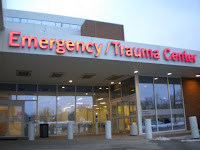September 18th, 2011 by DrWes in Health Policy
No Comments »

It was kind of funny reading this recent article from the New York Times that focuses on a relatively small health data breach from Stanford Hospital’s emergency room:
A medical privacy breach involving Stanford Hospital in Palo Alto, Calif., led to the public posting of data for 20,000 emergency room patients, including names and diagnosis codes, on a commercial Web site for nearly a year, the hospital has confirmed.
Since discovering the breach last month, the hospital has been investigating how a detailed spreadsheet made its way from one of its vendors, a billing contractor identified as Multi-Specialty Collection Services, to a Web site called Student of Fortune, which allows students to solicit paid assistance with their schoolwork.
Gary Migdol, a spokesman for Stanford Hospital and Clinics, said the spreadsheet first appeared on the site on Sept. 9, 2010, as an attachment to a question about how to convert the data into a bar graph.
Although medical security breaches are not uncommon, the Stanford breach was notable for Read more »
*This blog post was originally published at Dr. Wes*
August 12th, 2011 by Emergiblog in Opinion
No Comments »

 You want to be a registered nurse?
You want to be a registered nurse?
Let’s cut through the B.S. and get real about it.
Put a hold on all this soft-focus “I live to care!” or “It gives my life meaning…”
Here’s the reality.
***
You will study your butt off.
Nursing science is based on biology, chemistry, microbiology, anatomy, physiology, psychology, sociology and philosophy. Yeah, every single one of them. You will incorporate those into every decision you make in your practice. It’s called critical thinking. You master it and become a professional, or you don’t and you become a robotic technician.
Bottom line.
Your choice.
Oh, and the studying doesn’t stop after you graduate. Nursing school is just the warm-up.
***
The work is physically exhausting and emotionally demanding. Read more »
*This blog post was originally published at Emergiblog*
July 26th, 2011 by DavedeBronkart in Opinion
No Comments »

“Health is social,” says SPM member Phil Baumann, RN (@PhilBaumann) at HealthIsSocial.com.
Slate has a dramatic story of how a mother’s Facebook network helped spot – rapidly – Kawasaki Disease, a rare auto-immune disease that the family’s doctors had initially missed.
Her social network contains some medically knowledgeable people. (Do you have any docs, nurses, etc in your Facebook circle?) Note that friends’ availability is sometimes far greater than a doctor’s office.
Read how the diagnosis unfolded. And read what her family physician said, when she called from the E.R.:
“You know what?” he said, “I was actually just thinking it could be Kawasaki disease. Makes total sense. Bravo, Facebook.”
Then this, as the crisis wound down: Read more »
*This blog post was originally published at e-Patients.net*
June 25th, 2011 by Michael Kirsch, M.D. in Opinion
No Comments »

 I received a call recently from an emergency room (ER) physician about a patient who presented there with rectal bleeding. Does this sound blogworthy? Hardly. We gastro physicians get this call routinely. Here’s the twist. The emergency room physician presented the case and recommended that the patient be discharged home. He was calling me to verify that our office would provide this patient with an office appointment in the near term, which we would. We had an actual dialogue.
I received a call recently from an emergency room (ER) physician about a patient who presented there with rectal bleeding. Does this sound blogworthy? Hardly. We gastro physicians get this call routinely. Here’s the twist. The emergency room physician presented the case and recommended that the patient be discharged home. He was calling me to verify that our office would provide this patient with an office appointment in the near term, which we would. We had an actual dialogue.
This was a refreshing experience since the typical emergency room conversation of a rectal bleeder ends differently. Here’s what usually occurs. We are contacted and are notified that the patient has been admitted to the hospital and our in-patient consultative services are being requested. In other words, we are not called to discuss whether hospitalization is necessary, but are simply being informed that a decision has already been made.
There is a tension between emergency room physicians and the rest of us over what constitutes a reasonable threshold to hospitalize a patient. I have found that many ER docs pull the hospitalization trigger a little faster than I do. What’s my explanation for this? Here are some possibilities. Read more »
*This blog post was originally published at MD Whistleblower*
February 26th, 2011 by Steven Roy Daviss, M.D. in Health Policy, Opinion
No Comments »


I read today that Eastern Ontario has started a bed registry to keep track of where open psychiatric beds are available. This is something I’ve long advocated. The United States now has less than 10 percent of the beds it used to have 50 years ago. Granted, treatment has improved and community resources are enhanced. But there are still areas that often do not have a sufficient number of hospital beds for folks needing acute inpatient psychiatric care.
 The Ontario story described in the Ottawa Citizen states that six of the area hospitals have been connected to a computerized “bed board” that provides real-time information on who has an appropriate bed available. This saves time in the ER and gets patients to needed treatment more quickly. Otherwise calls need to be made to each individual hospital, which is very time-consuming.
The Ontario story described in the Ottawa Citizen states that six of the area hospitals have been connected to a computerized “bed board” that provides real-time information on who has an appropriate bed available. This saves time in the ER and gets patients to needed treatment more quickly. Otherwise calls need to be made to each individual hospital, which is very time-consuming.
And it’s not uncommon for all the beds to be full. Last July there was an EMTALA complaint against a hospital in Maryland because a patient sat in the ER all weekend, and this hospital said they had no beds to admit the patient to. The Department of Health and Mental Hygiene (DHMH) investigated the complaint and found that indeed the hospital was full that weekend. The ER’s record indicated that all the hospitals (except the state hospitals) were called that weekend and all indicated their beds were full. So DHMH visited every hospital (about 28, I think) thinking that surely one of them had an empty bed they were hiding. What they discovered was that every single psychiatric bed in the state was full.
Unfortunately, we have no way of determining how often this happens, but we know if happens often enough. A “bed board” like this would be very helpful in quickly finding beds when needed and keeping track of the extent of this problem. Having patients wait in ER for days is unsafe and is even discriminatory. How many people with stroke or uncontrolled diabetes sit in ER for days waiting to find a bed for treatment? I’d like to hear others’ thoughts on how this problem can be addressed.
*This blog post was originally published at Shrink Rap*




 You want to be a registered nurse?
You want to be a registered nurse?












